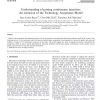IJMMS
2006
14 years 3 months ago
2006
In this study, we argue that users participating in the design process will form the participation as a function of their professional role, but also as a function of their identi...
IJMMS
2006
14 years 3 months ago
2006
This paper reports on a study investigating the effect of single-media and multimedia presentations on the resulting knowledge. First, this study investigated the stability of est...
IJMMS
2006
14 years 3 months ago
2006
One of the major challenges in computer vision is to create automated systems that perform tasks with at least the same competences as human experts. In particular for automated i...
IJMMS
2006
14 years 3 months ago
2006
Change awareness is the ability of individuals to track the asynchronous changes made to a collaborative document or graphical workspace by other participants over time. We develo...
IJMMS
2006
14 years 3 months ago
2006
Along with increasing investments in new technologies, user technology acceptance becomes a frequently studied topic in the information systems discipline. The last two decades ha...
IJMMS
2006
14 years 3 months ago
2006
Trust is a key factor in consumer decisions about website engagement. Consumers will engage with sites they deem trustworthy and turn away from those they mistrust. In this paper ...
IJMMS
2006
14 years 3 months ago
2006
Based on the expectancy disconfirmation theory, this study proposes a decomposed technology acceptance model in the context of an e-learning service. In the proposed model, the pe...
IJMMS
2006
14 years 3 months ago
2006
For human operators supervising a complex system it is crucial to have a powerful and flexible information presentation system. In order to reduce the cognitive load operators oft...
IJMMS
2006
14 years 3 months ago
2006
This experimental study investigates the effects of animated graphic colors on attention and perceived usability of users from two cultural groups, American and Thai. The experime...
IJMMS
2006
14 years 3 months ago
2006
Students rated 16 tutorial statements on negative politeness (i.e., how much the tutor ``allows me freedom to make my own decisions'') and positive politeness (i.e., how...


